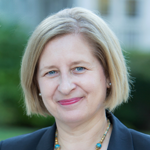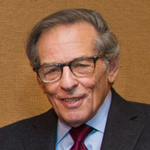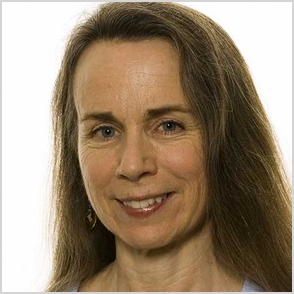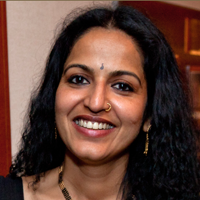
Fellowships
From the Curator
In ways both obvious and subtle, my Nieman Fellowship year worked a special magic on me, challenging the conventions I had about journalism and my place in its ecosystem. Harvard, the curator, the other fellows, and my own independent studies served up a challenge to do more and do better.
As curator of the Nieman Foundation, I now have the privilege of offering others the same transformative experience. I have witnessed many times over the power of a Nieman Fellowship to coax and inspire journalists toward a greater ambition for their industry and their craft.
I have watched new leaders emerge and return to their newsrooms with expanded vision. I have seen innovations in storytelling, news reporting, technology and organization emerge from our fellows’ singular and collective labors. I have seen journalism made stronger.
For more than 80 years, Nieman has welcomed some of the world’s most accomplished and promising journalists, giving them the gift of time and intellectual resources to fortify their work. As journalism has changed, so too have many of the qualities of our program and of our fellows. Having added a short-term visiting fellowship to our traditional yearlong program, we now embrace an expanded cohort of developers, entrepreneurs, academics and others who are increasingly influential in how we create and receive news.
The Nieman Foundation is privileged to be part of this extraordinary university. If time at Harvard would expand your vision and help you help journalism, we invite you to apply.
Alumni Perspectives
Robert Caro, NF ’66
Journalist, Author, Biographer
“One of things I was thinking about was Robert Moses and urban political power and how I would need to do a book to explain. And it took a lot of nights to think that through. That’s really one of the things the Nieman year did for me.”
Read Robert Caro’s perspective
Mary Schmich, NF ’96
Columnist, Chicago Tribune
“When I went back to my job … I carried the word ‘courage’ with me like a lucky charm, and to this day I’m fortified by the people who during my Nieman year helped me find it.”
Read Mary Schmich’s perspective
Rema Nagarajan, NF ’12
Senior Assistant Editor, The Times of India
“Any time and every time that you face any kind of challenges in your workplace and in your career, you have now a whole bunch of [Nieman Fellows] you can consult. They’re all people with whom you have a personal equation. They’re scattered all over the world.”
FAQ
What is a Nieman Fellowship?
A Nieman Fellowship is an extraordinary, transformative learning opportunity open to journalists working in all media in every country around the world. Those selected for the program spend two full semesters at Harvard auditing classes with some of the university’s greatest thinkers, participating in Nieman events and collaborating with peers. Nieman Fellows are also able to audit classes at other local universities including MIT and Tufts.
Each year, the Nieman Foundation awards paid fellowships to up to 24 journalists working in print, broadcast, digital and audiovisual media. Journalists and other professionals working in positions that support journalism, such as the business or technology departments of news companies, are welcome to apply for one of the foundation’s short-term Visiting Fellowships.
During their time at Harvard, Nieman Fellows attend seminars, shop talks, master classes and journalism conferences designed to strengthen their professional skills and leadership capabilities, thereby helping to fortify the news industry itself. With the knowledge they gain on campus and the relationships they build, fellows often return to work as journalism entrepreneurs, industry innovators and top managers in their newsrooms.
Am I eligible?
All applicants for academic-year Nieman Fellowships, including freelancers, must be working journalists with at least five years of full-time media experience. Journalism-related work completed as a university student does not count as professional experience. Professionals who work in public relations or in a position whose primary focus is not the media are not eligible to apply.
During the two years prior to applying, an applicant should not have participated in a fellowship lasting four months or longer.
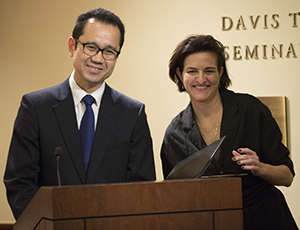
2019 Nieman Fellows and co-chairs of the 2019 Louis M. Lyons Award for Conscience and Integrity in Journalism Yoshiaki Nohara and Samantha Appleton
Candidates nominate themselves for Nieman Fellowships by submitting an application and supplementary materials. There are no age limits or academic prerequisites, and a college degree is not required.
After candidates have been chosen, they must agree in writing to honor all leave stipulations made with their employers; to refrain from professional work during the fellowship year, except as approved by the Nieman curator; and to complete work in a minimum of one course per semester and honor commitments made to faculty as a condition of auditing a class. Fellows also must remain in residence in the Cambridge area while classes are in session and participate in all Nieman Foundation programs.
What types of fellowships are available?
Each year, the Nieman Foundation selects up to 12 U.S. citizens and 12 international journalists for academic-year Nieman Fellowships. All prospective fellows must speak, read and write English fluently.
U.S. and international candidates may also apply for the Nieman-Berkman Klein Fellowship in Journalism Innovation.
Citizens of Canada who are interested in the Martin Wise Goodman Canadian Nieman Fellowship, which will be offered in the 2025-2026 academic year, should apply with the International Nieman Fellowship application.
Journalists with China expertise may apply for the Schmidt Futures Nieman Fellowship for China Coverage, which includes a nine-month reporting fellowship with The Associated Press following the academic year at Harvard. This new Nieman-AP partnership, supported by Schmidt Futures, provides journalists with China expertise the chance to sharpen their skills and enhance their coverage of China and U.S.-China policy issues.
Candidates who are citizens of both the U.S. and another country should email nieman_applications@harvard.edu for guidance about which academic-year Nieman Fellowship application category will be appropriate.
How much financial support will I receive as a fellow?
Nieman Fellows receive a stipend of $85,000 paid over a nine-month period to cover living costs.
The Nieman Foundation also provides a health insurance supplement (up to $6,000 each for the fellow and a spouse, and up to $3,500 for each child younger than 18) and a childcare allowance for children 12 and younger that ranges from $10,000 to $16,000 depending on the number of children, with an additional $10,000 if a child is aged three or younger. This table outlines the childcare allowances depending on the ages and number of children.
Fellows are not eligible for health care insurance through Harvard University. Individuals who are unable to retain their current health insurance would have the option of purchasing a plan through the Massachusetts Health Connector, which is an independent state agency that serves as a marketplace for MA residents to find, compare, and enroll in health insurance.
Nieman additionally covers the cost of attending Harvard classes for fellows and their affiliates. Affiliates are the partners and spouses of fellows. They enjoy many of the same privileges as fellows and may attend classes, use Harvard libraries and other facilities, and are welcome to participate in almost all Nieman activities.
Because funds from the original Nieman bequest are restricted to U.S. citizens, International Nieman Fellows are encouraged to work with Nieman staff to find financial support from foundations and journalism organizations in the fellows’ home countries. However, obtaining outside funding is not a condition of being selected for a fellowship; all Nieman Fellows – international and domestic – receive the same stipend and allowances throughout the fellowship year. The Nieman Foundation works with several international foundations that provide stipendiary support to citizens of certain nations or regions of the world.
Through generous gifts made to the foundation, Nieman is able to support a number of fellowships with endowed funds. Learn more about our named fellowships
What courses can I take?
Fellows choose their own course of study at Harvard. Some use the year to deepen their knowledge in a field of interest while others seek to broaden their knowledge in several areas or prepare for a new assignment. Fellows are required to complete course work in at least one class each semester. They choose their courses from offerings at Harvard College and at the graduate schools throughout the university as well as classes at the MIT Media Lab and the Fletcher School of Law and Diplomacy at Tufts University. Each school maintains its own course catalog. View the Harvard course catalog.
What’s a typical week like as a Nieman Fellow?
In addition to taking advantage of all the university has to offer, Nieman Fellows participate in a series of weekly activities organized by the Nieman Foundation. These events bring the fellows together with members of the Harvard faculty, leading journalists and many other accomplished guests.
Soundings are talks given by the fellows for the fellows that address the question, “Why do I do what I do?” Each Tuesday evening, a member of the class shares the story of his or her journalistic life and hosts an informal meal for invited guests.

2019 Nieman Fellows Steve Myers and Mary Ellen Klas lead a session at the 2019 Christopher J. Georges Conference on College Journalism
Wednesday afternoon seminars bring leading teachers, writers and scholars from the Harvard faculty to Lippmann House for presentations and lively discussions with fellows and other members of the Harvard community. The topics are diverse and thought provoking, and typically reflect the special interests fellows have developed in classes and lectures.
On occasional Fridays, fellows gather to discuss issues in journalism during shop talks with leading journalists. As part of the shop talk schedule throughout the year, special training sessions and master classes are organized around the fellows’ needs and interests.
Each semester, the Nieman Foundation also offers writing courses in narrative nonfiction for fellows and their affiliates.
The Nieman Foundation also convenes workshops and conferences that bring journalists together with leaders in a variety of fields, academics, and other experts to explore issues important to the press and the public good. The foundation regularly co-sponsors talks and events in partnership with other centers and schools at Harvard and in the greater Boston community.
What is family life like in and around Cambridge?
Nieman staff helps fellows and their families find housing and acclimate to their new surroundings by providing information about apartments for rent, local schools, shops and restaurants, and other practical information about living in Cambridge and the greater Boston area. Fellows, affiliates and children are encouraged to take advantage of Harvard’s museums, cultural events, athletic facilities and libraries and to explore all the cultural and recreational activities that Harvard Square and the New England region have to offer.
Fellows also have access to Walter Lippmann House, the Nieman Foundation’s offices, located just a few blocks from Harvard Yard. In addition to the main seminar room where most Nieman events are held, the house has a working kitchen, a large library and a computer lab where fellows and their families can work and socialize. The house is named after journalist and Harvard graduate Walter Lippmann, whose counsel helped create the Nieman Foundation at Harvard. To learn about the history of the house, see Lippmann House: “Room just to hang out” from the 75th anniversary edition of Nieman Reports.
What is the deadline for applications?
Nieman Fellowships
- International Nieman Fellowship application (for non-U.S. citizens): December 1
- U.S. Nieman Fellowship application (for U.S. citizens): January 31
What are the selection timelines?
Nieman Fellowships
For international candidates (non-U.S. citizens)
- December 1: Application deadline
- April: Applicants will be notified of their status, and Zoom calls will be scheduled with those advancing to the interview stage.
- May: International fellowship offers will be made.
- June: The press release announcing the Nieman class be posted.
- Around mid-August: The fellowship will begin.
For U.S. candidates (U.S. citizens)
- January 31: Application deadline
- May: Applicants will be notified of their status, and interviews will be scheduled with those advancing to the interview stage. Fellowship offers will be made shortly thereafter.
- June: The press release announcing the Nieman class will be posted.
- Around mid-August: The fellowship will begin.

